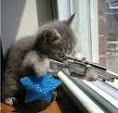The mental health of officers and sailors in the Navy was, obviously, a concern of the Navy. But from the way that the system was set up, you would think quite the opposite was true.
The shining example was the Personnel Reliability Program, or PRP. People in the PRP included anyone whose job had to do with nuclear stuff and, for all I know, intel and crypto folks (but don't quote me on the latter two). If someone was in the PRP,on the left side of the inside of the folders holding their service record and medical records was a large pink sheet with a triangle that proclaimed that particular service member was in the PRP and that any issues pertaining to reliability, etc. were to be reported to that person's commanding officer.
It took no great skill of imagination to realize that the initial result of such a call would be that you'd lose your security clearances and, depending on what you did, your job. You'd be sent to some bullshit medical holding billet while the Navy figured out how best to get rid of you. If you weren't shitcanned outright, you'd have a black mark on your record showing a hint of unreliability, which would be fatal for the career of any officer. Even without being a member of the PRP, most everyone knew that admitting to any mental health problem was a career-killer. Since everyone knew this, there was terrific real-world pressure to keep quiet about anyone who was having problems, regardless of what the official policy happened to be about "looking out for your shipmates".
None of that changed the fact that people had a lot of problems. Families broke up under the stress of near constant absences. Relationships broke up, often when a shore-duty puke stepped out with the girlfriend or boyfriend of a deployed sailor.
What happened was a lot of self-medication, 99% of the time with alcohol, sometimes with other drugs, though urinalysis made using anything other than alcohol tricky to do. If someone sought professional help, they went to a shrink on the outside, they used an assumed name and paid cash.[1] But it was rare, indeed, for someone to cough up the cash to get help, so help usually came from a case of Bud or a bottle of Jack Black.
All this came to mind when I read the coverage about the shooting at Ft. Hood a few days ago. It is pretty obvious to me, at least, why, if anyone noticed that the shooter was becoming unstable, nobody said anything about it.
____________
[1]There was a story of someone who was so pissed off at their commanding officer that they went to a civilian shrink, used the CO's name, and confessed to all sort of unsavory and illegal things, culminating with a discussion of who he was going to kill. As the story goes, the shrink called the cops, the cops called the base cops and the CO had a very unpleasant time until they showed the shrink the CO's photo and the shrink said it wasn't him. But that's probably not really true.
Survived the Latest "Snowmageddon," Such as it Was
6 minutes ago

5 comments:
Yep. This is why the old skill set of looking your buddy in the eye and sticking your finger in his chest was - and still is - the best and most reliable form of peer support known to man. We have become so conflict averse and PC that this form of buddy care is nearly illegal and hence, extinct. Great blog.
Hate to tell you this, Jefe: This blog post is based on events a quarter-century old. The "we can't do anything, it'd wreck his career" mindset predates most everyone in the military today.
I had to have some ortho surgery at two periods during my career and wound up on LIMDU. I knew at least three to four Chief Engineers coming out of the nut house, er psych ward. Sustained stays prior to med boards. I do not know what happened to all of them, I do one was med. boarded out.
All these men struck me as good, solid men overwhelmed by fatigue and work.
Sad and it still goes on.
Stephen, almost ever man I knew who served as either a main space CPO or as a Chief Engineer was divorced, as well.
They were either divorced, getting divorced, going to the psych ward, coming out of the psych ward, drunk, getting drunk, staying drunk...it is a very tough job.
I do not think the SWO navy really does a good job on CHENGS. The Aussies had it better, they were in fact Marine Engineers and so were all their rates. Knew of a Canadian destroyer with a CDR CO and a full O-6 Cheng. thye got along fine.
Post a Comment